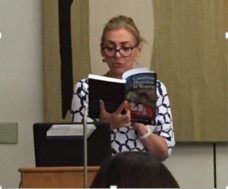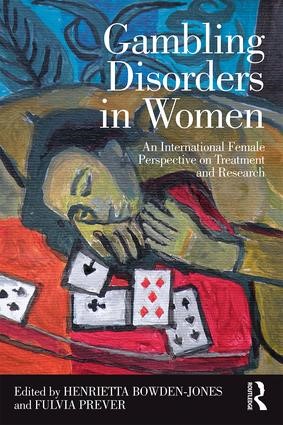
 Stephanie Bramley (Research Associate, left) and Caroline Norrie (Research Fellow) from the Social Care Workforce Research Unit, King’s College London report from a seminar about Gambling Disorders in Women, held in London on 12 September 2017. (1179 words)
Stephanie Bramley (Research Associate, left) and Caroline Norrie (Research Fellow) from the Social Care Workforce Research Unit, King’s College London report from a seminar about Gambling Disorders in Women, held in London on 12 September 2017. (1179 words)
A new book ‘Gambling Disorders in Women: An international female perspective on treatment and research’ was launched at a special seminar on 12 September in Parliament’s Portcullis House. The book aims to raise the profile of gambling disorders in women and also provide fellow professionals across the world with a shared understanding of evidence based treatment and recovery in problem gambling literature and research.
The seminar was organised by book editors Dr Henrietta Bowden-Jones (Founder and Director of the National Problem Gambling Clinic, London) and Dr Fulvia Prever (Psychologist and Psychotherapist working in the National Health System Addictions Clinic in Milan, Italy). It was sponsored by Gambling Integrity and hosted by Karen Buck MP.
The seminar was a unique opportunity to hear from some of the contributors to the book—prominent women in the field of gambling-related harm research and practice, as well as from women who have experienced disordered gambling themselves. It’s going to be an important book as it draws attention to female problem gamblers, who are often under-researched in comparison to their male counterparts.
Following introductions, Fulvia Prever told us about female gambling in Italy where just one state-run clinic treats individuals with gambling addictions. Fulvia reported that in Italy some types of gambling have recently become “normalised” and are no longer stigmatised for women, for example, slot machines, scratchcards and playing bingo in public places including bars. She also acknowledged the limited clinical experience focusing on women and how some of the women drop out of treatments such as Cognitive Behavioural Therapy CBT). Fulvia argued that women need space to talk about themselves and called for new research to consider the impact of gambling on women from different countries and cultures.

Dr Henrietta Bowden-Jones (Founder and Director of the National Problem Gambling Clinic) reads selected extracts from the new book
Sarah Harrison, Chief Executive of the Gambling Commission—the regulator of gambling in the UK—spoke about the prevalence of gambling by women in this country. In 2016, 44.3% of women (+3.6% from 2015) participated in at least one form of gambling and 13.5% of women (+2.1% from 2015) participated in at least one form of online gambling (Gambling Commission, 2017). In addition, 0.1% of women could be classified as problem gamblers and more, 3.5% of women (+2.2% from 2015), could now be classified as at-risk gamblers (these figures are lower than for men). Sarah expressed her concern about the wider costs of gambling-related harm experienced by female gamblers to their family members, children, friends and more broadly, the economy. She also questioned whether gambling interventions (harm or risk reduction) appeal to women and wondered whether gambling interventions are appropriately designed for them. This was a strong argument for a shift in focus from the ‘problem gambler’ to ‘problem gambling’ meaning that a broader public health approach might be necessary in order to recognise the “interconnectiveness” of gambling and health. She called on Public Health England and other bodies in Scotland and Wales to be more involved in addressing gambling-related harm. There was a need also for greater investment from the gambling industry itself in order to limit gambling-related harm and fund treatment. Sarah also commented on the lack of diversity in the gambling industry’s workforce. She thought that women were under-represented in this business and more women should be holding senior posts.
Carolyn Harris, MP, spoke about her role as Chair of the Fixed-Odds Betting Terminals All Party Parliamentary Group. The government is currently conducting a Review of Gaming Machines and Social Responsibility Measures which is due to conclude shortly, in Autumn 2017.
From the university sector, Dr Amanda Roberts, of the University of Lincoln, presented the findings of her research into problem gambling and interpersonal violence. She estimated that 18.7% of female problem gamblers were involved in acts of interpersonal violence compared to 11.5% of male problem gamblers (these are of course small numbers). These possibly surprising findings were qualified due to methodological problems but it was agreed more research was needed in this area. But women also feature more often as victims of interpersonal violence—15.7% of women problem gamblers and 10.2% of male problem gamblers may be affected. Amanda called for support services to be more aware of female problem gamblers being violent but also their risk of being a victim of violence.
Sarah Ramanauskas, Chair of the gambling support charity Betknowmore and Senior Partner at Gambling Integrity, spoke about women’s limited experiences of gambling support within the criminal justice system. She reported that women often find that there is no help for gambling addiction in prison, so, upon release, they tend to continue the cycle of gambling, committing offences and re-entering the criminal justice system.
Angela Mooney, a Chartered Counselling Psychologist at the National Problem Gambling Clinic, discussed the treatment of female problem gamblers at this clinic. She actually questioned the appropriateness of Cognitive Behavioural Therapy for female problem gamblers as it seemed difficult in practice for women to engage with this as it might not provide adequate space for them to explore and discuss their difficulties. Her clinic therefore has been developing a psychodynamic group protocol for women which focuses on life pressures, how their early life and other events led them to gamble and coping strategies. Results from this are looking promising, after 15 sessions, 82% of the women taking part in this initiative had stopped gambling and all had completed this form of treatment.
The seminar concluded with a panel discussion involving Simon Thompson (Interim Chief Executive of GamCare), Suzanne Irwin (GamCare), Angela Mooney (NPGC) and Karen Buck MP. Simon Thompson, who has a background in social care, called for NICE guidance on gambling-related harm. Karen Buck would like to see easier pathways for women to engage with gambling support services. Simon Thomas (Chief Executive Officer and Chairman of the Hippodrome Casino, London) coined the term ‘gambling-related pleasure’ in acknowledgement that gambling can be a fun, entertaining activity for some individuals. However, he also called for more to be done to prevent gambling-related harm. He would like to see population-level changes imposed by the government so that GPs, Social Workers and other people involved with the identification and management of gambling-related harm get educated about this subject. He thought it might be useful to develop a classification system for different forms of gambling, something akin to the UK Drug Classifications system, which would outline the types of gambling-related harm which may be experienced via participation in each gambling activity. This struck a chord with the work we are doing at SCWRU which is investigating gambling-related harm and adults at risk and social care practice when supporting individuals and their families.
We hope that this event will prompt new research to highlight the ways in which gambling-related harm may be experienced differently by women and how support services and treatment approaches could be better tailored to address the needs of women experiencing gambling-related harm.
Stephanie Bramley is Research Associate and Caroline Norrie is Research Fellow at the Social Care Workforce Research Unit.
References
Bowden-Jones, H. & Prever, F. (Eds.) (2017). Gambling Disorders in Women: An international female perspective on treatment and research. London: Routledge.
Bramley, S., Norrie, C. & Manthorpe, J. (2017) ‘The nature of gambling-related harms for adults at risk: a review‘, London: Social Care Workforce Research Unit, Policy Institute at King’s, King’s College London.
Gambling Commission (2017). Gambling participation: activities and mode of access – February 2017. Accessed September 27th, 2017, from http://live-gamblecom.cloud.contensis.com/Docs/Survey-data-YEAR-TO-December-2016.xlsx
